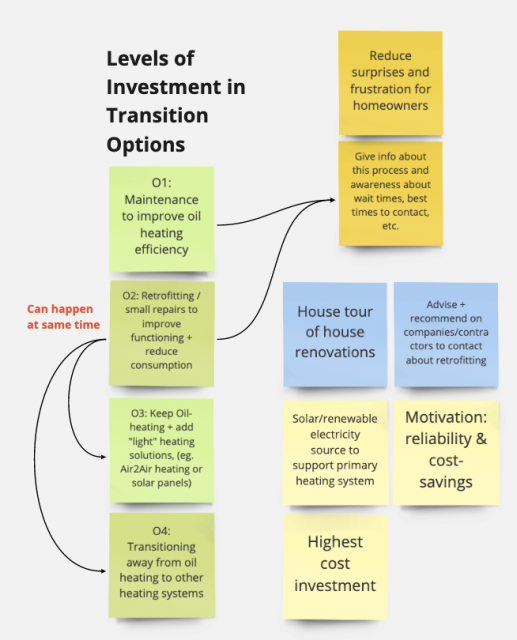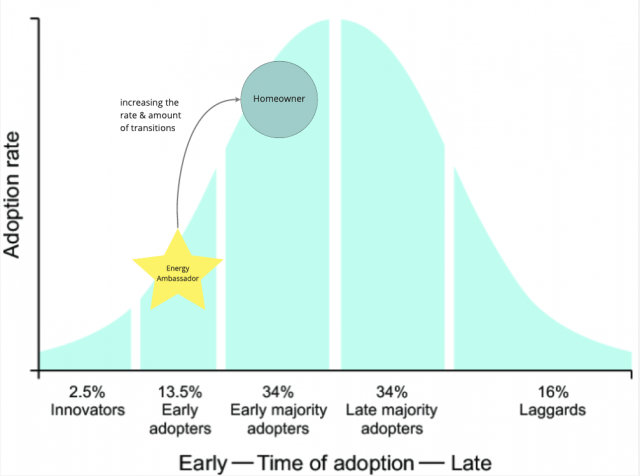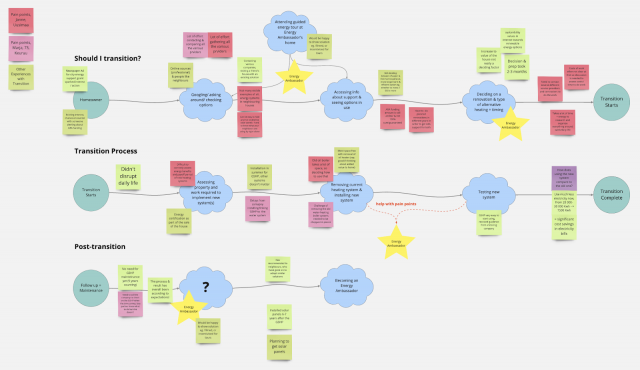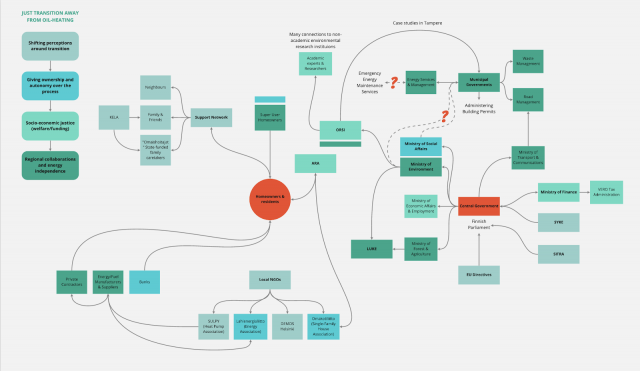This blog post reports on work-in-progress within the DfG course! The post is written by one of the three groups dealing with the Ministry of Environment’s project brief on ‘Just transition to post-oil heating in homes’. The group includes Elizabeth Atkins, Elisa Dametto, Jane Lehtinen, and Uttishta Varanasi.
Following the mid-review presentation in April, our team has shifted to generating ideas and refining them towards a final solution. Armed with insights gathered in the first phase of the project, we have focused on how homeowners in smaller communities can be supported in transitions through leveraging existing people’s capabilities, networks, and resources to speed up the process of transitioning away from oil-heating.
We formulated the following design drivers:
-
Community-centered knowledge and systems.
-
Supporting self-sufficiency and energy-independence.
-
Approach with equity over equality -provide adequate support to meet people where they currently are.
-
Enabling a range of technological choices.
-
The plurality of adaptation strategies.
-
Transparency with honest, accessible, and inclusive communication.
-
Supporting resilience-building to change.
-
Leveraging partnerships and existing resources.
Our main focus from these eight has been on community-centered knowledge and systems and leveraging partnerships and existing resources as well as attempting to keep an approach with equity over equality as a backdrop for anything we propose.

We have identified four levels of investment in making transitions ranging from very low involvement and easy steps such as improving existing oil heating systems and reducing oil consumption to partial or complete transitions to further reduce or fully transition away from oil. This division has helped us clearly define areas that require different types of involvement and assistance from the Ministry of Environment.
The solution we have decided to focus on and develop further concentrates on the latter options, focusing on the idea of building a programme and a network of enthusiastic citizens to act as Energy Ambassadors within their local community. These ambassadors would be citizen experts who could act as a trusted resource to residents before, during, and after the transition process. In return, the ambassadors would be supported in their work by the ministry and local governing bodies.

To understand what we might have missed in imagining how this would work, we interviewed two more homeowners who had either completed the transition away from oil heating or are in the beginning stages of a transition. They added their perspectives on what they wished they had known before and where they might have benefited from outside advice. In addition, we have taken continuous feedback into account from numerous expert tutorials. These discussions have helped us distill our idea and discover pain points that need to be worked through. We then generated a user journey map to help us further reflect on our proposed idea and how it could be realized.

As we move closer towards our final presentation, the key issues in refining a feasible solution are sharpening the role and focus of the Energy Ambassadors in each municipality, further working out the details of the programme and how the Ministry and the programme can interact with other actors and existing organizations as potential stakeholders, as mapped below.

Some key details concerning our proposal that we are uncovering include identifying incentives for becoming an energy ambassador, identifying key supporting structures for the programme from ministries and housing organizations, as well as defining the lifespan of the programme and how the participation of ambassadors is expected to be like. In this way, we can present a clear role that the Ministry of Environment can play in initiating, launching, and maintaining the proposed program.
The DfG course runs for 14 weeks each spring – the 2020 course has now started and runs from 25 Feb to 19 May. It’s an advanced studio course in which students work in multidisciplinary teams to address project briefs commissioned by governmental ministries in Finland. The course proceeds through the spring as a series of teaching modules in which various research and design methods are applied to addressing the project briefs. Blog posts are written by student groups, in which they share news, experiences and insights from within the course activities and their project development. More information here about the DfG 2020 project briefs. Hold the date for the public finale 09:00-12:00 on Tuesday 19 May!
